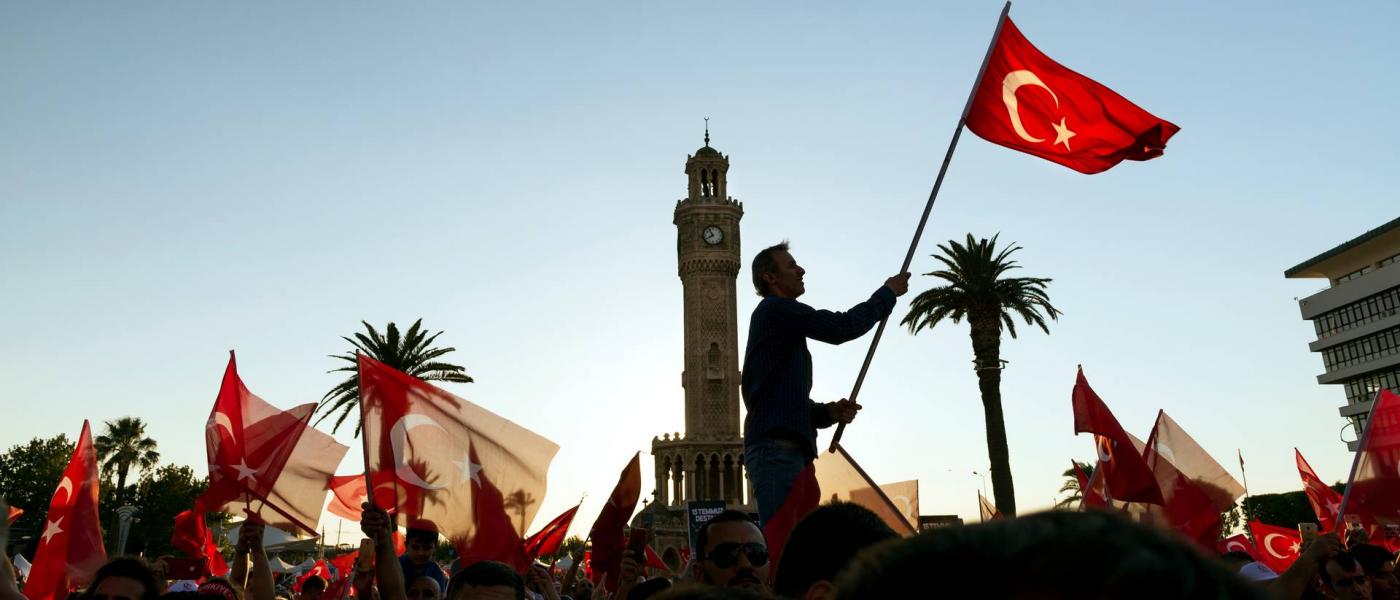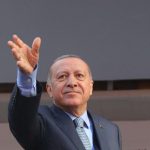By Emre Erdogan
As Turkey heads for municipal elections on March 31, there is an effort to understand how different factors, first and foremost the ongoing economic crisis, will impact voter behavior. A crucial, but the often neglected factor is political tribalization. While sociological cleavages or class-based alignments are still accepted as the most useful analytical tools for many political analysts, the current zeitgeist opens up avenues for more unorthodox approaches, such as taking tribes as the primary political units.[1]
In a nutshell, tribal politics is related to how human beings have evolved and how they socialize. According to this line of research, human brains are hard-wired for living in tribes—as they have done for tens of thousand years—of 50 to 100 members, where members know, trust in and cooperates with each other. Kinship defines the tribe’s borders very clearly and makes it easy to recognize foreigners and keep them beyond the borders. Thinking beyond the tribe requires cognitive effort, whereas using tribal thinking as a shortcut is easy and automatic. Instead of classifying individuals based on their unique characteristics, deciding to cooperate or defect based on tribal clues is much easier.
In the political context, tribalization starts with the definition of “us”—categorization to define the boundaries of the tribe. This is based on collective identities, which form the illusion of living within a small group sharing the same values and grievances and having the same political desires. This process ends with the definition of a “foreigner”, standing beyond the wall, disliked and possibly hated by the members of the tribe. Although tribalization seems to be something observed in the formation of every political identity from nations to religions, this process may be accelerated depending on structural conditions such as geography and time. When people feel they live in a time in which their survival is threatened by economic crises, wars, political instability or terrorist attacks, being attached to one’s tribe is most compelling. Tribal solidarity gives a feeling of security while the revival of tribal cultural values brings back the meaning of life as taught in the schools, churches and mosques. Moreover, tribal thinking identifies scapegoats for one’s misfortunes and explains everything in a simple way.
Tribalization is not unique to Turkey; it can be observed from the United States to Venezuela and from Russia to the United Kingdom. Thinking beyond tribal borders is dependent on many structural factors, including economic ones, in addition to the development of individual characteristics such as openness to change, cognitive complexity and the possession of liberal values.
Tribalization in Turkey
In Turkey’s case, the tribalization of politics is visible in some very specific domains. Any map showing voter preferences in the 2017 referendum and the 2018 presidential election indicates a strong physical segregation of citizens based on their political preferences. Based on a very simple human instinct, citizens prefer to live near to people similar to them. The concentration of the same-party voters in the same geography is widely observed in Turkey. From the provincial level to neighborhoods, there are many units dominated by a particular party, such as İzmir by the Republican People’s Party (CHP), Konya by the Justice and Development Party (AK Party), and most of the southeastern provinces dominated by the People’s Democratic Party (HDP). This trend can also be observed within cities with voters of different parties concentrated in different neighborhoods, where they feel themselves part of the dominant lifestyle. There are more examples at the district or the neighborhood levels, where one or other party has been hegemonic for many years.
There is a strong physical segregation of citizens based on their political preferences.
Another piece of evidence for the tribalization of Turkish politics is the change in the news-consumption patterns of voters and the emergence of echo chambers. A recent study shows that supporters of different political parties—the members of different political tribes—are receiving their news from totally different sources and form their opinions based on those.[2] Moreover, almost all of them perceive news sources of others as biased, unlike their own. As their perception of reality is only based on homogenous information source, members of each tribe position themselves as the sole holders of the truth and regards members of the other tribes as deniers. Hence, the political discussions between members of different tribes turn into moral debates, rather than democratic deliberation. With this moralization of discussions, communication between different political tribes disappears. As the news media in Turkey also has been polarized and mainstream platforms have been wiped out over time; the walls between political tribes have been fortified.[3] The survey mentioned above shows that the digital and social media in Turkey is not less polarized than traditional media. Hence, these tools do not solve the problem, but rather contribute to tribalization.
The rise of a “post-truth” environment is only possible through the tribalization of politics, especially in the Turkish case. Although the Oxford English Dictionary defines “post-truth” as “relating to or denoting circumstances in which objective facts are less influential in shaping public opinion that appeals to emotion and personal beliefs,” many personal opinions are formed by judging the source of news items rather than by evaluating their content. Hence, people accept the arguments of the members of their tribe without questioning their validity and they can be prejudiced against those of the other tribes. In Turkey, many public discussions are easily turned into a competition between two different facts and not surprisingly most people support the one endorsed by the chief of the tribe. Although a small number of fact-checking organizations try to provide reliable information for citizens, even they are polarized. Each camp runs its fact-checking organization and the independent ones are accused of bias depending on the topic[4].
Turkey’s Kulturkampf
With the consolidation of voters in fewer parties over the last one and a half decade, and the intensification of the country’s Kulturkampf,[5] the tribalization of Turkish politics has become more visible. It is possible to explain the results of every election or referendum with this approach. Two tribes, one led by the AK Party and the other one by the CHP voted against each other in each election or referendum. This divided picture survived with small changes within and between tribes such as the emergence of the Good Party and the temporary alliance between the AK Party and the HDP during the Kurdish opening process. Recent developments—such as the Gezi protests in 2013, the 2016 coup attempt, the referendum of 2017 and the elections of 2018—contributed to the consolidation of the tribal borders. Each referendum or referendum-like election became an expression of one’s loyalty to tribe and previous preferences have been transformed to emotional investments, preventing cooperation and dialogue between camps. In addition to the continuous cycle of elections and referendums, everyday discussions about alcohol usage, abortion, religious education in high schools and even music tastes have functioned as daily plebiscites, dividing people and reunifying them under the banners of their tribes.
There is no short-term solution to the rise of tribal politics in Turkey.
From this perspective, there is no short-term solution to the rise of tribal politics in Turkey. Affective polarization and continuous symbolic clashes in everyday life and politics create a substantial obstacle to bridging the gaps between tribes. The current political system, especially the country’s brand of presidentialism, restricts the opportunities for cooperation on political issues. The lack of a middle ground composed of independent media and civil society organizations prevents the development of empathy and mutual respect across tribes. Under these conditions, the survival of social coherence in Turkey becomes an important puzzle for everyone worrying about the future of the country.
Political tribalization also has strong implications for Turkey’s “Western-ness,” which is a continuous subject of debate in the country. If Western-ness is endorsed by only one political tribe, it will not be sustainable, and it does not have a future unless the language for Turkey’s Western-ness becomes tribe-and-value-neutral. In the past, there has been a tendency among secular Turks to associate Western-ness with their own tribal values and lifestyle, including distance to religion and consumption of alcohol, precisely to gain a rhetorical advantage against the other camp. In doing so, they did not mind undermining diversity and tolerance, which are Western values. Turkey’s Western-ness should be described as a common denominator rather than in a way that fortifies tribal boundaries.
[1] Tribal politics is a relatively new concept. See Amy Chua, Political Tribes: Group Instinct and the Fate of Nations (2018); Francis Fukuyama, Identity: the Demand for Dignity and the Politics of Resentmen (2018)t; Marc Hetherington and Jonathan Weiler, Prius or Pickup? How the Answers of the Four Simple Question Explains America’s Great Divide (2018).
[2] Emre Erdoğan, “Dimensions of Polarization in Turkey”, German Marshall Fund of the United States, On Turkey Series, 2018,http://www.gmfus.org/publications/dimensions-polarization-turkey
[3] European University Institute—Center for Media Pluralism and Media Freedom, “Monitoring Media Pluralism in Europe: Application of the Media Pluralism Monitor 2017 in the European Union, FYROM, Serbia & Turkey- Turkey Country Report,” 2018.
[4] “Fact-checkers seek out grain of truth in Turkey’s fake-news onslaught”, Politico, https://www.politico.eu/article/turkey-fact-checkers/
[5] Kulturkampf is a term coined to describe the conflict between two alternative worldviews. For the Turkish context, see Ersin Kalaycıoğlu, “Kulturkampf in Turkey: The constitutional referendum of 12 September 2010,” South European Society and Politics, 2012
Photo Credit: ardasavasciogullari / Shutterstock
Source: Gmfus



